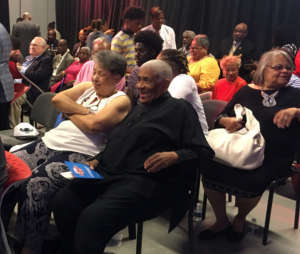WASHINGTON — In 2011, Natalie Randolph made headlines in D.C. and around the country when she was named the head football coach at Coolidge High School. While she faced some of the expected sexist backlash, the news was largely positively reported. That reaction stood in sharp contrast to what Wanda Oates experienced at Ballou High School a few decades before as a trailblazer in prep sports, one of the reasons her career was honored and celebrated this month.
Oates was one of 10 members inducted into the inaugural class of the DCSAA Hall of Fame, a regal affair at the D.C. Office of Cable Television, Film, Music and Entertainment in Northeast on June 3. The building will serve as the physical home of the Hall of Fame, a mix of public, private and charter school sports history from the District.
The rest of the class included athletes like NBA star Elgin Baylor, as well as a host of coaches and administrators. But it’s hard to imagine any had as much impact on social progress as Oates, who became the first woman coach of a boys varsity high school basketball team when she took over at Ballou following a successful stint with the girls.
But even before her boys basketball tenure, Ballou turned to Oates to turn around its failing football program. One might be tempted to think that by 1985, a woman coaching male athletes would be accepted, but that was far from the case.
Despite the school’s decision, the deputy superintendent rescinded Oates’ appointment, and she never took the field as a football coach. As far as Oates was concerned, that was their loss.
“Even though they voted against me, they made the statement that Washington, D.C., may have missed a historic contribution from this young lady,” she told WTOP. “In other words, they should have allowed me to coach that team.”
But Oates still got her shot coaching the boys and made the most of it. In 1991, under Oates’ leadership, Ballou’s boys team won the East championship of the Interhigh, which preceded DCIAA. The success, however, wasn’t celebrated outside the school.
“It was not well-received at all,” said Oates. “I got no assistance from the school system. I got no assistance from the athletic office. In fact, my whole tenure coaching boys was like a living hell.”

Oates’ trailblazing eventually left a less arduous path for the likes of Randolph to follow, albeit not one without its own travails, even in the 21st century.
“It was not all peaches and roses,” said Randolph. “There was discrimination. There was pushback. There was difficulty with some people.”
Randolph, who now works as the Title IX coordinator for DCSAA, was on hand for the induction ceremony. While she knew of Oates when she took the job at Coolidge, it wasn’t really until after Randolph moved on from coaching that she fully understood Oates’ impact and how it had paved the way for her.
“Most of the media coverage was very positive,” said Randolph. “Most people were very happy. There were a few people that were skeptical, but by and large, it was a pretty great reception. And I’m sure I owe much of that to her.”
Even though Oates is semi-retired, she is still fighting to create opportunities for local youth to grow through sports, particularly young women.
“I feel that they need to reemphasize physical education at all levels — elementary, middle school and senior high school,” said Oates. “I’ve gone to a number of schools and they don’t even have physical education. The kids, if they don’t play in their Little League teams, they don’t get the experience of football and basketball, softball and baseball, they just don’t get it.”
That remains an uphill battle, but one made a little easier thanks to the contributions of those like Oates. As far as Randolph is concerned, those uphill battles are the important ones to fight.
“No matter what you do, there’s always going to be some sort of difficulty,” said Randolph. “As I used to tell my kids, ‘if it’s not hard, it’s not worth it.’”





